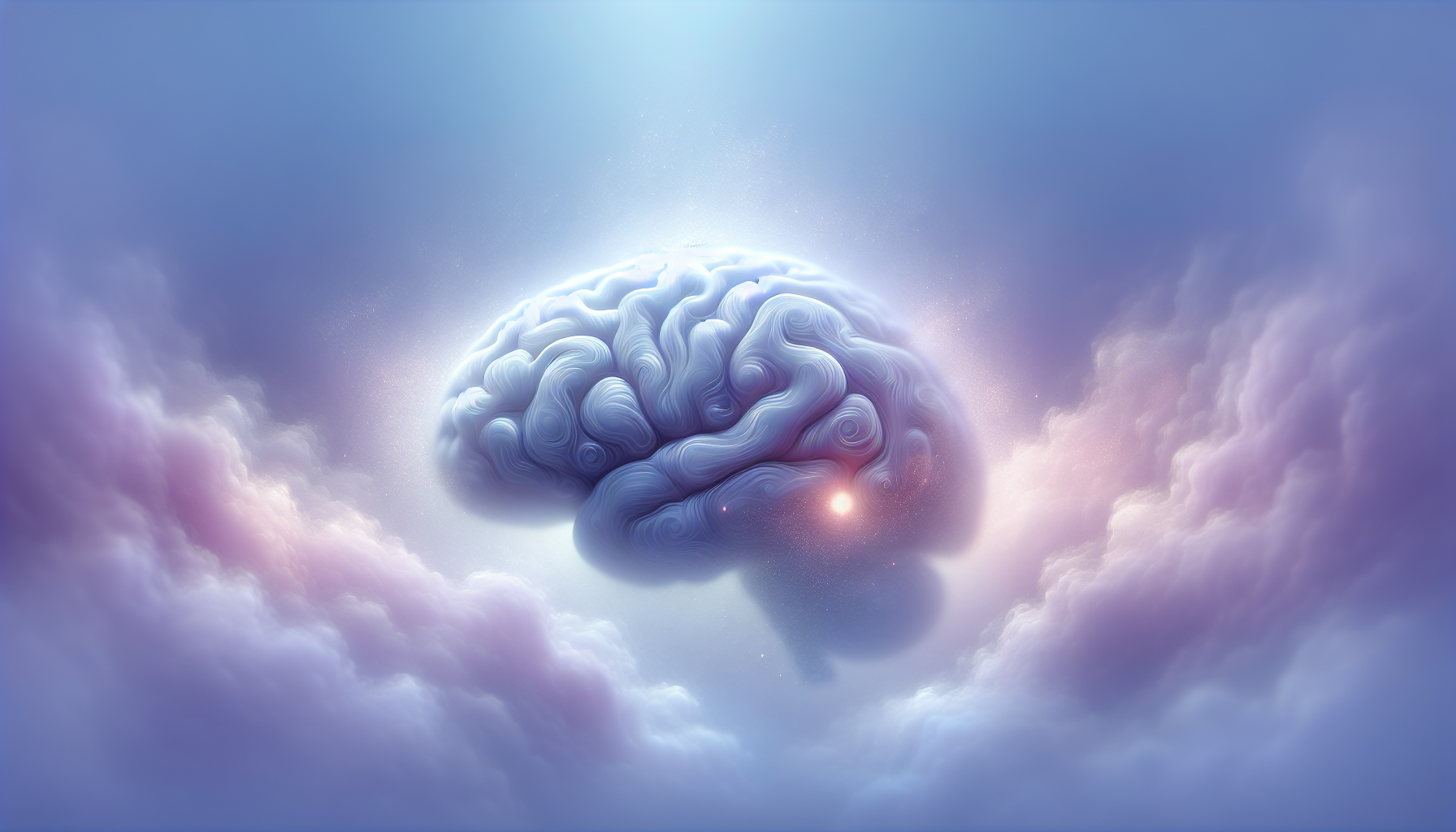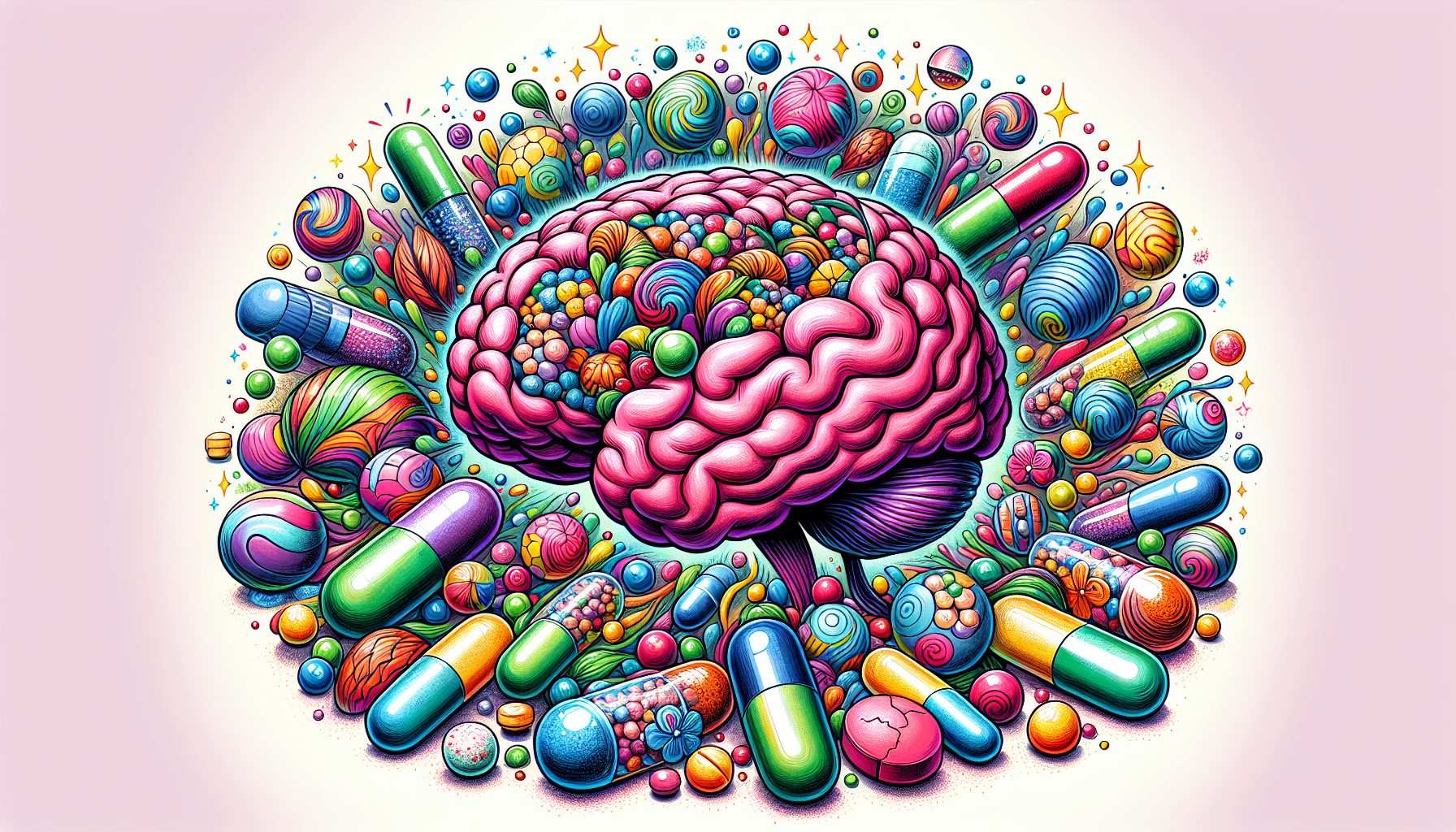Struggling with brain fog can feel overwhelming, especially when it impacts your ability to concentrate, remember important details, or maintain mental clarity throughout the day. Brain fog, often associated with poor sleep quality, chronic stress, and nutritional deficiencies, affects many individuals and can disrupt daily life. Fortunately, you can regain mental sharpness and improve your cognitive function by addressing the root causes and incorporating the best supplement for brain fog.
This article highlights some of the most effective supplements, such as Omega-3 fatty acids, Vitamin D, B vitamins, Ginkgo Biloba, and Lion’s Mane Mushroom that have been shown to alleviate brain fog symptoms and enhance cognitive performance. Along with supplements, maintaining a healthy lifestyle through balanced nutrition, regular exercise, and quality sleep is essential for long-term brain health and preventing cognitive decline. Join us to discover how to combat brain fog and restore mental clarity.
Key Takeaways
- Brain fog is characterized by symptoms such as poor concentration, memory issues, and mental clarity challenges, often linked to factors like sleep deprivation, chronic stress, and nutritional deficiencies.
- Effective supplements for alleviating brain fog include Omega-3 fatty acids, Vitamin D, B Vitamins, Ginkgo Biloba, Lion’s Mane Mushroom, and Magnesium, all supported by clinical evidence to enhance cognitive function.
- In addition to supplementation, lifestyle changes such as maintaining a balanced diet, engaging in regular exercise, and ensuring quality sleep are essential for improving brain health and reducing brain fog symptoms.
Understanding Brain Fog

Brain fog is a term used to describe symptoms that can include memory trouble, a lack of focus, fatigue, and scattered thoughts. It’s often described as a mild cognitive impairment, although it’s not a diagnosable medical condition. Despite being poorly understood within the medical community, brain fog can significantly impact one’s ability to concentrate and the overall quality of life.
The characteristics of brain fog typically include poor concentration, memory issues, and a lack of mental clarity. These symptoms can make it challenging to perform daily tasks, leading to frustration and decreased productivity. Persistent brain fog can indicate underlying medical conditions. These may include thyroid issues, vitamin deficiencies, or sleep disorders.
Recognizing the symptoms and causes of brain fog is crucial for finding effective solutions. Next, we’ll explore the specific symptoms and common triggers of brain fog.
Symptoms of Brain Fog
Brain fog is often described as a temporary reduction in mental clarity and efficiency. Common brain fog-related symptoms include confusion, lack of concentration, forgetfulness, and general mental cloudiness. These cognitive difficulties can make multitasking and managing daily responsibilities particularly challenging.
Supplementation has shown the potential to improve concentration and mental clarity, highlighting the benefits of certain brain supplements. Early identification and management of these symptoms can be crucial in effectively dealing with brain fog.
Common Causes of Brain Fog
Several factors can contribute to brain fog, including poor sleep quality, chronic stress, and nutritional deficiencies. Many adults do not get the recommended amount of sleep, essential for brain health and cognitive performance. Chronic stress increases cortisol production, impairing cognitive function, and poor diet can lead to deficiencies in essential nutrients like vitamins B and D, which are crucial for brain health.
Other triggers for brain fog include hormonal changes, certain medications, and underlying medical conditions like autoimmune diseases or chronic inflammation. The COVID-19 pandemic has also been associated with persistent cognitive impairments, resulting in more reports of brain fog among recovering patients.
Top Supplements to Combat Brain Fog

Certain supplements can be effective in alleviating brain fog symptoms. We will explore six evidence-based supplements that may help improve cognitive function and mental clarity. These supplements include:
- Omega-3 Fatty Acids
- Vitamin D
- B Vitamins
- Ginkgo Biloba
- Lion’s Mane Mushroom
- Magnesium
These supplements support brain health, enhance cognitive function, and alleviate brain fog symptoms. Next, we’ll discuss each supplement's benefits, recommended dosages, and potential interactions.
Omega-3 Fatty Acids
Omega-3 fatty acids, especially EPA and DHA, are vital for cognitive function and overall brain health. They improve learning, enhance cognitive performance, and increase blood flow to the brain. Clinical trials suggest a typical dose of combined EPA and DHA ranges from 1 to 3 grams daily for cognitive benefits.
For our regular followers, you know how important it is for us to highlight excellent non-fish oil sources of omega-3s. In our article, “From Algae to Awesomeness: Five of the Best Vegan Omega-3 Supplements You Need to Know,” we discuss the availability of algae-derived DHA and EPA. Unlike other plant-based omega-3s that need to be converted in the body from precursors, algae-derived omega-3s are as directly available as fish oil omega-3s, making them an outstanding option for diet-conscious users. Whether you prefer fish oil or algae-based supplements, omega-3s remain essential for brain health. However, it's important to remember that omega-3s can interact with blood-thinning medications like warfarin or aspirin, so consult a healthcare professional before adding them to your regimen.
Vitamin D
Vitamin D deficiency is linked to cognitive decline and can contribute to symptoms of brain fog. Low levels of vitamin D can have a detrimental effect on cognitive health. They may also worsen symptoms of brain fog. Supplementing with vitamin D can help improve memory, concentration, and mood, alleviating brain fog.
Adequate vitamin D levels are vital for overall cognitive health, making it a crucial supplement for those with brain fog. Consult your healthcare provider to determine the appropriate dosage for your needs.
B Vitamins
B vitamins are crucial in energy production and nerve health and in reducing brain fog. These vitamins contribute to DNA and RNA synthesis and support neurochemical production, which is vital for optimal brain function. B vitamin supplementation can slow cognitive decline for individuals with mild cognitive impairment, thereby improving mental function and alleviating brain fog-related symptoms.
Vitamin B12 deficiency is particularly concerning, as it can lead to anemia and fatigue, negatively affecting mental clarity and cognitive performance. Ensuring your diet includes sufficient B vitamins through food or supplementation can help maintain brain health and improve overall mental alertness.
For those interested in adding a B Complex supplement to their routine, we recommend checking out our article, “Everything You Should Look for In a Vitamin B Complex Liquid Supplement.” In this article, we review five of the top B Complex liquid supplements available, helping readers make informed choices and save time selecting the right product for their needs.
Ginkgo Biloba
Ginkgo Biloba is a tree that originated in China. It has been utilized for medicinal purposes for centuries. Ginkgo Biloba is known to enhance cognitive performance and overall wellness. It contains flavonoids and terpenoids beneficial for cognitive function. Studies suggest that Ginkgo Biloba may improve cognitive function and Alzheimer’s disease symptoms when used with conventional medicine.
The suggested dosage for Ginkgo Biloba is 40 mg, taken thrice daily. Alternatively, you can take 80 mg twice a day. However, it can interact with anticoagulants and blood clotting medications, so it’s essential to consult a healthcare professional before starting this supplement.
Lion's Mane Mushroom
Lion’s Mane Mushroom is recognized for its potential cognitive enhancement properties. It enhances memory, focus, and concentration by stimulating nerve growth factor synthesis, supporting neuron growth, and improving cognitive abilities. The typical effective dosage range for Lion’s Mane extract is 1050 to 3000 mg per day.
Including Lion’s Mane Mushroom in your supplement regimen can significantly benefit cognitive health and help combat brain fog. For readers looking to explore this nootropic further, we recommend checking out our article, “The Many Health Benefits Of Taking A Lion's Mane Supplement.” In this article, we introduce five top-quality Lion’s Mane and multi-mushroom complex supplements in both capsule and powdered form, offering a comprehensive guide for those interested in boosting brain health.
Magnesium
Magnesium is crucial for cognitive functions and overall brain health. Adequate magnesium intake helps maintain cognitive health and reduces brain fog symptoms. A magnesium deficiency can contribute to mental fatigue and brain fog, making it essential to ensure you’re getting enough of this vital nutrient.
Incorporating magnesium-rich foods into your diet or taking magnesium supplements can help alleviate brain fog and support overall brain health. For those interested in supplementing, magnesium bis-glycinate chelate is a highly bioavailable and absorbable form of magnesium. We recommend reading our article, “Magnesium Marvels: Discover the Five Best Magnesium Bisglycinate Chelate Supplements for Your Wellbeing.” This article reviews five top magnesium bis-glycinate chelate supplements from leading nutraceutical companies, offering a helpful guide for those seeking to add this essential mineral to their wellness regimen.
L-Theanine
L-Theanine is an amino acid. It can be found in mushrooms and green and black teas. It enhances mental alertness and reduces stress, alleviating brain fog symptoms. Green tea provides 8 to 30 milligrams of L-theanine, making it a natural and accessible source.
Supplementing with L-theanine can enhance cognitive function and support overall brain health. Consider including it in your daily routine to improve mental clarity and reduce stress.
Lifestyle Changes to Improve Brain Health

In addition to supplements, lifestyle changes can significantly improve brain health and help combat brain fog. A balanced diet, regular exercise, and quality sleep are essential to a healthy lifestyle that supports cognitive function and improves brain fog symptoms.
Incorporating these changes enhances the effectiveness of brain health supplements and improves mental clarity and cognitive performance. We’ll explore these lifestyle changes in more detail.
Balanced Diet
A balanced diet is crucial for maintaining cognitive health and preventing brain fog. Dietary deficiencies, particularly in essential nutrients like vitamins B12 and iron, can lead to mental issues such as brain fog.
Consuming a variety of nutrient-rich foods supports brain function and improves mental clarity. To promote overall brain health, consider following a diet that includes healthy fats, lean proteins, and plenty of fruits and vegetables.
Regular Exercise
Engaging in regular physical activity has numerous benefits for brain health. Aerobic activities, in particular, can enlarge the hippocampus, which is crucial for memory and learning. Exercise also improves cognitive performance by reducing insulin resistance and inflammation while promoting the release of growth factors in the brain.
Regular exercise boosts brain function and reduces mental fatigue, making it an effective strategy for combating brain fog. Incorporate physical activity into your routine to support cognitive health.
Quality Sleep
Prioritizing sleep quality is essential for effective brain function and preventing brain fog. Quality sleep significantly improves cognitive performance and mental clarity. Consistent physical activity also contributes to better sleep quality, vital for cognitive health.
Ensure you get adequate rest each night to support brain health and reduce the risk of cognitive decline and brain fog. Establish a regular sleep schedule and create a relaxing bedtime routine to improve sleep quality.
How to Choose the Right Supplement

Choosing the right brain supplement can be overwhelming, given the many options available. Carefully consider product claims and avoid those that promise easy cognitive decline reversal. Consulting a healthcare professional before starting any new supplement ensures safety and helps prevent medication interactions.
Let’s explore some critical steps to help you choose the right supplement.
Check Ingredient Labels
Carefully examine supplement labels to identify key ingredients that may reduce brain fog symptoms. Be aware of potential adverse effects of long-term supplementation, like high calcium levels from Vitamin D or gastrointestinal upset from large doses of ashwagandha.
It’s also important to follow recommended dietary allowances for vitamins and minerals to avoid potential health risks. Always read labels carefully and consult a healthcare provider if you have concerns.
Look for Clinical Evidence
Choosing brain supplements grounded in clinical research can enhance mental clarity and ensure safety in usage. Supplements like Omega-3 Fatty Acids, Vitamin D, B Vitamins, Ginkgo Biloba, Lion’s Mane Mushroom, and Magnesium have clinical evidence supporting their cognitive benefits.
Look for products with strong backing from clinical studies to confirm their effectiveness and safety. This can help you decide which supplements to incorporate into your routine.
Consult a Healthcare Professional
Professional advice is essential before starting any new supplement to prevent adverse effects. Consulting a healthcare provider can help rule out underlying conditions contributing to brain fog and ensure you choose the best supplements for your needs.
Discussing any supplement regimen with a healthcare professional can help mitigate potential side effects and ensure you make safe and effective cognitive health choices.
Potential Side Effects and Precautions

While brain supplements can offer numerous benefits, it’s important to be aware of potential side effects and precautions. Always consult a healthcare professional before starting a new supplement regimen, as supplements may interact with medications and cause side effects.
Avoid supplements like resveratrol if you are preparing for surgery or on blood thinners, and be cautious of high doses of magnesium and caffeine, which can cause gastrointestinal issues and other adverse effects.
Allergic Reactions
Some individuals may experience allergic reactions when taking certain dietary supplements. Individuals should monitor for any allergic reactions when starting new supplements. For example, Lion’s Mane Mushroom can cause a rash in some people. If you notice any allergic responses, discontinue use and consult a healthcare provider immediately.
Interactions with Medications
Consult healthcare professionals when considering brain health supplements to avoid potential drug interactions. Some supplements might interact adversely with medications used to treat neurological diseases.
For instance, Lion’s Mane Mushroom can interfere with blood clotting abilities. Always seek professional guidance to ensure safety when integrating supplements with existing medications.
Overdosage Risks
Overconsumption of some cognitive supplements can lead to severe health consequences, including toxicity and organ damage. Adhering to recommended dosages is essential to mitigate long-term toxicity risks.
The risk of overdosage can lead to severe health outcomes, highlighting the importance that users follow recommended guidelines. Always consult a healthcare provider to ensure you take the correct dosage.
Wrapping Up Our Discussion
In summary, brain fog can significantly affect cognitive performance and quality of life, making it essential to understand its symptoms and root causes. From sleep deprivation and chronic stress to vitamin deficiencies, various factors contribute to brain fog. Fortunately, supplements like Omega-3 fatty acids, Vitamin D, B Vitamins, Ginkgo Biloba, Lion’s Mane Mushroom, and Magnesium have shown clinical benefits in alleviating brain fog symptoms and improving cognitive function. These essential nutrients support brain health, combat mental fatigue, and enhance cognitive performance. For those experiencing mild cognitive impairment or chronic fatigue syndrome, these supplements can be vital in slowing cognitive decline and improving mental clarity.
However, supplements alone are only part of the solution. A holistic approach, including maintaining a balanced diet, regular exercise, and prioritizing quality sleep, is essential for long-term brain health. Additionally, consulting healthcare professionals before starting brain supplements ensures their safe and effective use. For those looking for more information, our articles on vegan Omega-3s, liquid Vitamin B complexes, Lion's Mane Mushroom, and highly absorbable Magnesium bis-glycinate chelate provide a deeper look into the best brain health supplements. These steps can alleviate brain fog, enhance cognitive function, and support overall brain health.
Brief Answers to FAQs
What are the common symptoms of brain fog?
Common symptoms of brain fog include confusion, lack of concentration, forgetfulness, and a sensation of mental cloudiness. Recognizing these signs is essential for addressing the underlying causes effectively.
Which are the best supplements for brain fog?
Omega-3 Fatty Acids, Vitamin D, B Vitamins, Ginkgo Biloba, Lion's Mane Mushroom, and Magnesium are among the most effective supplements for alleviating brain fog. Consider incorporating these into your regimen for improved cognitive function.
How can lifestyle changes help improve brain health?
Lifestyle changes like a balanced diet, regular exercise, and adequate sleep can greatly enhance brain health and cognitive function. Prioritizing these habits fosters overall well-being and enhances mental clarity.
How do I choose the right supplement for brain fog?
To effectively choose a supplement for brain fog, prioritize ingredients backed by clinical evidence, carefully examine ingredient labels, and consult a healthcare professional to confirm safety and efficacy.
What are the potential side effects of brain supplements?
Brain supplements may cause allergic reactions, interact with medications, and present risks of overdosage. It is essential to consult a healthcare professional before beginning any new supplement.
Thanks for taking this journey to explore the best supplement for brain fog. If you want to add to your library of knowledge and are interested in diving deeper into some of the supplements mentioned in this article, you should check out the links above. It could be a huge time-saver - you won't be sorry you took a look.
Also, please return soon to check out our next review of other incredible supplements – we’re always looking out for YOU!
*We are NOT qualified medical advisors. The content here is only based on our personal opinions and research and should NOT be used as a substitute for a healthcare professional's advice!











Member discussion